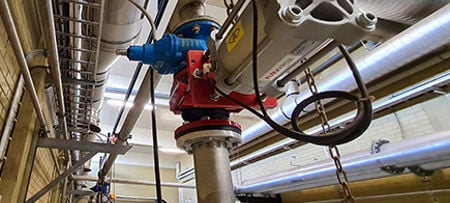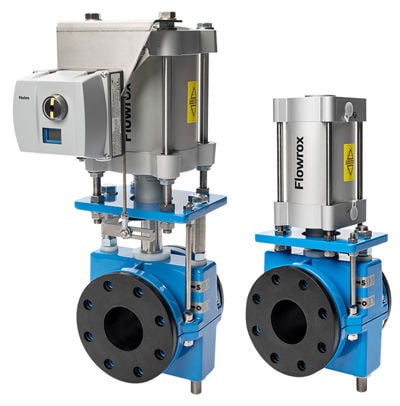Decades of flow control reliability in wastewater sand separation at Salon Vesi
Sep 25, 2023
Municipal wastewater treatment is needed everywhere. Even though valves are just one part of the process, they actually play an important role in making the whole process efficient. When the valves are chosen correctly, and they fit the process needs accurately, other parts of the process like pumps wear out less quickly. This was the case at the municipal waste water treatment plant in Salo, Finland.
Sand separation of sand basins can be challenging

Flowrox™ pinch valves provide bubble tight shut-off even if solids have built up on the sleeve wall. When compressed, any crystallized particles flake off the sleeve surface.
The flow of municipal wastewater is rarely regular, which was also an issue for our customer in Salo, Finland. The flow stops for a couple of hours during the night, and this can be challenging for the process equipment. Even more demanding is the sand, which needs to be separated before it affects the process equipment. If the sand is well separated, it will lead to direct cost savings, especially with maintenance costs.
Pinch valves are an optimal solution for sand separation
According to Jussi Randelin, the supervisor of the sewage plant, pinch valves are the only good choice for this application. Four Flowrox™ open body pinch valves provide 100 percent tight shut-off, even if solids have built up on the sleeve wall. When compressed, any crystallized particles flake off the sleeve surface. Technologically advanced rubber sleeves guarantee high wear and corrosion resistance, trouble-free operation and an extended lifetime. And this has been proved to be true, as the first Flowrox pinch valves were already installed in the customer’s wastewater line in 1985. After 37 years, they were still functioning as required. “I see these valves every day, but I never have to think about them. They just work well,” says Mr. Randelin. “Another advantage of pinch valves in this application is that even an irregular flow is not a problem for them,” he continues.
“I see these valves every day, but I never have to think about them. They just work well,” says Mr. Randelin.

First Flowrox pinch valves were installed in the customer’s wastewater line already in 1985. They were replaced in 2022, before any problems occurred.
Many factors affect the sleeve lifetime: the rubber material of the sleeve; the chemical composition and other properties of the slurry; and process conditions such as the temperature, pressure, valve size, cycle frequency, etc. The lifetime of a sleeve depends on the customer’s process. In this application, the sleeves have only been changed a couple of times during the valves’ whole lifetime, which ended up being as much as 37 years. Even after all those years, the valves were still working well, but the customer decided to change them before any problems occurred. The new valves were installed in 2022.
As all the pinch valves have an open body type, it can easily be seen if the sleeve is starting to break. The customer has also ordered spare sleeves, but as there has been no need to change them yet, the sleeves are stored in the inventory awaiting the next change. Salon Vesi has been extremely satisfied with the valves, which just keep working, day after day.
For more information, contact Jani Ristola: jani.ristola@valmet.com
In a nutshell
Customer & application: Salon kaupungin liikelaitos, municipal wastewater treatment plant in Salo, southwestern Finland.
Challenge: Sand separation of sand basins.
Solution: 4 x Flowrox open-body pinch valves with vacuum sleeves.
Remarkable: The first Flowrox pinch valves were installed in 1985. After 37 years, they were still functioning properly. Potential future faults were foreseen, and it was decided to renew them before any problems occurred.
Valmet offering: Our portfolio includes solutions for flow control, automation and filtration. They include Flowrox™ and Neles™ valves, Flowrox™ pumps, solids measurements and samplers, sludge dewatering optimizers, filter fabrics, and Valmet DNA Automation Systems — not to forget our comprehensive services.

Flowrox™ – Industry-leading products with a new identity. In July 2023 Flowrox valves and pumps started to ship in blue.
Read more about our flow control solutions for wastewater

Subscribe to our newsletter
Subscribe now to flow control newsletter and receive the latest insights directly to your email.
Subscribe



